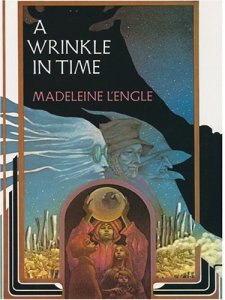I just read a really great article on NPR about the tough road to publication and subsequent struggles for the author of one of my favorite Sci-Fi classics and childhood reads, A Wrinkle in Time. I can say for certain that this book and the rest in the series by Madeleine L’Engle was a huge initial influence in my writing as I consider my genres of choice science fiction, fantasy, and speculative fiction. No other books besides D’Aulerie’s Book of Greek Myths and Margaret Atwood’s A Handmaid’s Tale influenced me as much as this one.
But it’s kind of serendipitous that this article came out because I was just wondering the other day how the hell this book every got published. I don’t know if you’ve ever had to explain the premise of your science-fiction book to anyone, but when you start to describe it you end up sounding high.The conversation goes something like this:
“Wow you’re writing a book, that’s so cool! What’s it about?”
“Well it’s about this future society that’s secluded from the outside world, except the outside world no loner exists but they don’t know that. So these people have lost the ability to reproduce and now they rely on parasites to do it for them….hey wait, why are your eyes glazing over?”
If explaining the plot of your book to your friends and loved ones is this hard, I can’t imagine how hard it must be to pitch a science fiction book to a publisher. And according to NPR, it was:
L’Engle’s granddaughter, Charlotte Jones Voiklis, describes the publishers’ befuddlement to All Things Considered host Melissa Block: “Was it for adults, was it for children? What is this, science fiction? Oh, I know what science fiction is, but there aren’t female protagonists in science fiction. Are you sure you want to talk about good and evil — isn’t that a little bit philosophical? Can’t you just cut that part out?”
Despite considerable misgivings, Farrar, Straus and Giroux bought the book. They sent it to an outside reader, who called it “the worst book I have ever read.” The book’s editor admitted it was “distinctly odd” but conceded: “I for one believe that the capabilities of young readers are greatly underestimated.”
His faith in young readers paid off. There are currently 10 million copies of the book in print.
And even though it was so uber successful that it went on to influence generations of readers, it still got a lot of flack. “Critics have attacked its theological themes, some calling it blasphemous, others complaining it’s too religious for a children’s book.”
I just want to say thank you, Ms. L’Engle for weathering the storm and putting this book out in the world. And thank you for not underestimating the intelligence of your readers — by doing so you encouraged them to move beyond conventional boundaries. Your work was a huge inspiration to me and set a standard for all other science fiction writers.









































